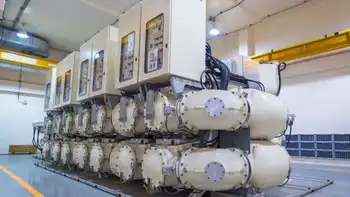NEMA commends FERC on DR ruling
ROSSLYN, VIRGINIA - The National Electrical Manufacturers Association NEMA commends the Federal Energy Regulatory Commission FERC for a recent decision that will improve the reliability and efficiency of the electric grid.
In its final rule, FERC has allowed locational marginal price LMP to be paid to demand response DR resources in organized wholesale energy markets. This means that electricity customers can enter into a voluntary agreement to be compensated to reduce usage when a utility transmits a DR signal.
“FERC’s decision will unleash technologies that provide the grid with new efficient ways to manage its loads,” said Kyle Pitsor, NEMA Vice President of Government Relations. “It will increase competition, allow new market entrants, and drive down costs for ratepayers. This policy is critical to the development of a smarter grid.”
LMP, the same market rate paid to generation resources, will be paid to DR technologies in situations when it meets a cost-effectiveness threshold. This threshold will consider DRÂ’s impact on remaining loads to prevent ratepayers who are not engaged in DR from having to incur a greater cost per unit.
Cost-effectiveness thresholds are to be determined by regional transmission organizations and independent system operators by July 22, in a filing to FERC.
Because interaction between utilities and buildings is central to the Smart Grid, NEMA’s High Performance Building Council is developing with ASHRAE American Society of Heating, Refrigerating and Air-Conditioning Engineers SPC 201, the interoperability standard that will allow all loads, generators, and meters within a high performance building to communicate in a common “language” with a utility.
Providing LMP in wholesale markets will encourage building owners to invest in DR to make their operations more efficient, from both energy and economic standpoints.
DR is one of the eight priority areas identified in the National Institute of Standards and Technology NIST Framework and Roadmap for Smart Grid Interoperability Standards.
“We have advocated that demand-side resources like DR ought to be compensated the same as supply-side resources,” said Jim Creevy, NEMA Director of Government Affairs. “FERC’s decision is a major step forward in that effort.”
Related News

Climate change: Electrical industry's 'dirty secret' boosts warming
LONDON - Sulphur hexafluoride, or SF6, is widely used in the electrical industry to prevent short circuits and accidents.
But leaks of the little-known gas in the UK and the rest of the EU in 2017 were the equivalent of putting an extra 1.3 million cars on the road.
Levels are rising as an unintended consequence of the green energy boom.
Cheap and non-flammable, SF6 is a colourless, odourless, synthetic gas. It makes a hugely effective insulating material for medium and high-voltage electrical installations.
It is widely used across the industry, from large power stations to wind turbines to electrical sub-stations in towns and…




